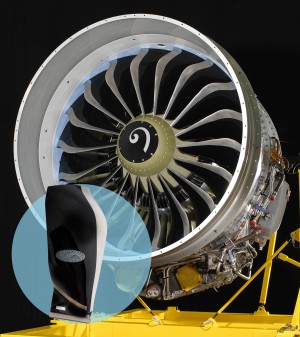“NH Advantage” Proves True For Albany International

(Photo by Cindy Kibbe)
"What turns out to make a big difference as we try to recruit young, talented engineers from around the country is the great quality of life around here," said Joseph Morone, President and CEO of Albany International.
We hear about the “New Hampshire Advantage” all the time. Our low personal taxes and great quality of life make headlines every time a company contemplates relocating to the Granite State.
But what happens after a company has been here for a while? Are company leaders still happy with their choice?
For leadership at Rochester, NH-based Albany International, the answer is an unequivocal “yes.”
Albany International has been a poster child of sorts for New Hampshire’s brand of economic success. In 2010, it relocated its corporate headquarters from Albany, NY, to Rochester with plans to build a new manufacturing plant and hire hundreds of workers. Even Vice President Joseph Biden, who visited the company earlier this year, hailed it as a prime example of public-private partnerships.
The move here, however, was by no means certain. In addition to its existing Engineered Composites division in Rochester, Albany International also has plants in the pro-business states of Texas and South Carolina, either one of which could have been the company’s new home.
Proximity matters
Albany Engineered Composites developed some very novel technology for weaving and molding carbon fibers into very light, very strong fan blades for jet engines based on a similar process that has its roots in the belts the company uses for paper production at its Paper Maching Clothing division – a technology that is going to be very much in demand, very soon.
According to Joseph Morone, Albany International president and CEO, a joint venture between General Electric and Snecma, called CFM International, has the lion’s share of the market for engines for the largest segment of commercial airplane market — the so-called “single-aisle aircraft.” Albany International builds parts for Snecma, an affiliate of multibillion-dollar French aerospace company Safran. Albany and SNECMA/Safran will be “roommates” in Rochester, sharing a production facility. See where this is going?
“Proximity really matters when you’re talking about developing technology,” said Morone.
That intention was all well and good, but Morone said he and Albany International leadership had to convince the shareholders a big move to this little state would be worth their while.
One of the keys cinching the deal, he said, was the personal interest the state’s leaders took in working out a deal with Albany International – namely the help of Gov. John Lynch and George Bald, commissioner of the Department of Resources and Economic Development.
“I can’t say enough about the governor,” said Morone. “Each time we ran into trouble, he jumped in personally and actively, and made sure this got done.”
Jobs now and later
Groundbreaking for the new 275,000-square-foot plant is expected this spring near its current facilities at the Granite State Business Park at Rochester’s Skyhaven Airport. Safran will own the plant with Albany International leasing back space.Again, Morone credits state leaders, this time Rochester city officials, for their efforts in securing a parcel of land and preparing it for construction, conditions that helped turn the relocation into a reality.
The hiring projections are also becoming a reality.
In 2011, Albany International added about 50 engineers, professional staff and manufacturing workers – many from New Hampshire and Rochester itself. The company expects to hire another 80 people by the end of 2012. Currently, some 250 employees already work at the corporate office and manufacturing facility.
In 2016 when the new plant reaches peak production, Albany International and SNECMA will each have added another estimated 200 workers. And the numbers will likely go up from there as the business grows, said Morone.
“What turns out to make a big difference – and is a big advantage for New Hampshire as we try to recruit young, talented engineers from around the country – is the great quality of life around here,” said Morone.
New Hampshire once again had an advantage that money couldn’t buy.
Making the makers

(Courtesy photo)
A jet engine fan blade made with Albany International's breakthrough woven technology.
A training infrastructure was also crucial for Albany International before it could move here.
To solve that conundrum, Great Bay Community College in Portsmouth stepped up to work with the company to develop a training program. Also in the works is a regional manufacturing training center providing programs for area employers.
“The higher education system here is highly oriented toward manufacturing,” said Morone. “[President] Will Arvelo at Great Bay has been a great partner.”
Morone also gives praise to Sen. Jeanne Shaheen for securing a $20 million federal grant supporting training programs statewide, including Albany International’s efforts.
The only concern Morone said he has about Albany International’s future here is the future of workforce development. While programs are being put in place now, he said, “it was dismaying to see the state pulling back on its commitment to higher education.
“If higher education is getting their resources cut back, it gets harder and harder for them to do what they need to do,” he said. “If the state is really serious about economic growth, that can’t continue.”
Size does matter
Larger states can offer financial incentives that vastly overwhelm what the Granite State can offer, but New Hampshire’s smallness was its strength, said Morone.
In Albany International’s case, personally committed leaders, an innovative and willing educational system, and a unique quality of life outweighed enormous tax breaks.
And in the end, it was New Hampshire itself that gained the advantage.



